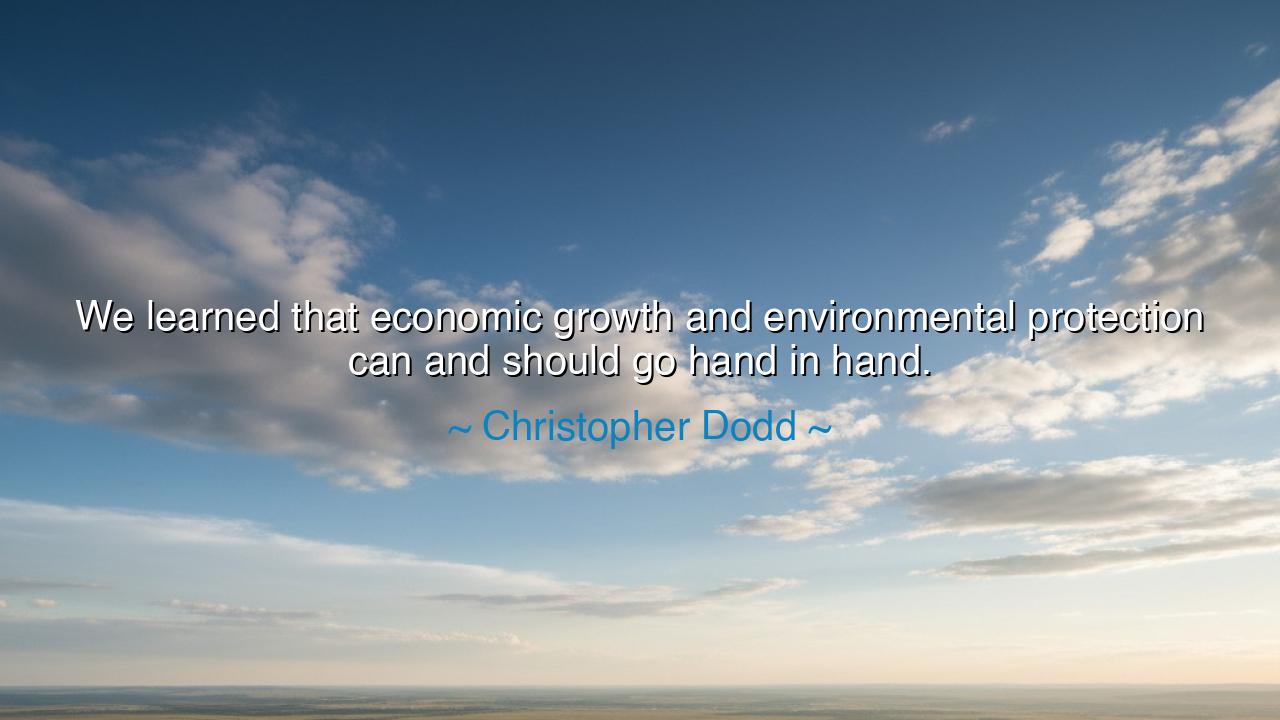
We learned that economic growth and environmental protection can
We learned that economic growth and environmental protection can and should go hand in hand.






When Christopher Dodd declared, “We learned that economic growth and environmental protection can and should go hand in hand,” he spoke to one of the great awakenings of the modern age—the realization that prosperity and preservation are not enemies, but partners in the same sacred task. For too long, humanity believed that wealth must come from the earth’s suffering, that progress demanded destruction. But Dodd’s words mark the dawn of wisdom: the understanding that the truest prosperity is one that sustains, not consumes; that a flourishing economy built upon a dying planet is no victory, but a quiet suicide. His statement is both a reflection of experience and a call to vision—a reminder that growth and guardianship are two hands of the same body.
In ancient times, wisdom was measured not by what one could conquer, but by what one could cultivate. The farmers of the Nile, the rice growers of the Yangtze, the shepherds of the Fertile Crescent—all understood that to take too much from the land was to destroy tomorrow’s harvest. Civilization itself was born from the balance between need and nurture. What Dodd expresses is a rediscovery of this timeless principle: that the economy of the earth is not a machine to be exploited, but a living system to be harmonized with. The ancients called this harmony the “Law of Return”—that what one takes must be replenished, lest the well of life run dry.
Consider the story of Costa Rica, a small nation that once suffered from massive deforestation. In the mid-20th century, nearly 70% of its forests were gone, sacrificed for short-term agricultural gain. Yet in the decades that followed, the nation transformed. Through bold policy, it invested in renewable energy, eco-tourism, and reforestation. The trees returned, rivers ran clear again, and the economy flourished—not in spite of this environmental rebirth, but because of it. Jobs grew, innovation thrived, and the people became richer both in spirit and in coin. Costa Rica became a living example of Dodd’s truth: that economic growth and environmental protection are not rivals—they are allies, when guided by wisdom.
Dodd’s insight also reflects a deeper moral truth: that humanity must rise above the illusion of separation. The air that carries industry’s smoke also carries the farmer’s seed. The ocean that bears our trade also bears our waste. To poison one is to poison both. Yet to heal one is to heal both as well. When nations invest in clean energy, in sustainable design, in education that unites commerce with ecology, they are not choosing constraint—they are choosing freedom. For what is freedom, if the air cannot be breathed, or the rivers cannot be drunk? To protect the earth is not to hinder progress—it is to ensure the possibility of progress for generations to come.
This truth is not new. Even Theodore Roosevelt, a century before Dodd, warned that reckless exploitation would leave America barren. “The nation behaves well,” he said, “if it treats its natural resources as assets which it must turn over to the next generation increased, and not impaired.” Roosevelt understood that conservation is not the enemy of ambition, but its foundation. Dodd’s words carry that same spirit into the modern world—into an age of globalization, industry, and climate awakening—reminding us that strength and stewardship must once again be united.
Yet Dodd’s use of the word “learned” is itself a confession of humility. It acknowledges that this wisdom was not always known—that it came through suffering, through floods and droughts, through the cost of pollution and the cries of species lost. Humanity learned this lesson not from books, but from the earth’s own scars. Now that we have learned, we must not forget. The next age of civilization must be defined by green innovation, where every invention serves both man and nature. In such a world, technology will not defy the forest, but defend it; cities will not crush the soil, but coexist with it. This is not idealism—it is survival refined into beauty.
Let this, then, be the lesson for all who would lead: that the wealth of nations and the health of the planet are one and the same. Seek prosperity, but not at the cost of the world that sustains it. Measure growth not only by the rise of profits, but by the rise of clean air, fertile land, and thriving life. Teach the young that economy and ecology share the same root—oikos, the home—and that to guard one is to preserve the other. For when humanity learns to grow without devouring, to build without destroying, it will at last fulfill the sacred task of civilization: to leave the Earth richer than it was found, and to pass on to the next generation not just wealth, but wisdom.






AAdministratorAdministrator
Welcome, honored guests. Please leave a comment, we will respond soon